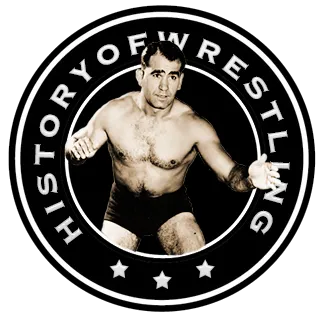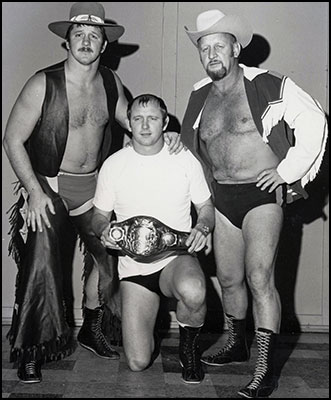by Stephen Von Slagle
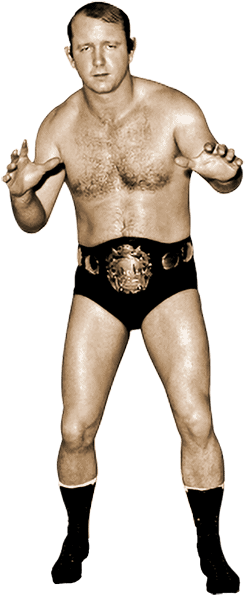 During a career that spanned over five decades, Dory Funk, Jr., one-third of the legendary Funk family (along with his father Dory Funk and brother Terry) is not only respected for being one of the greatest NWA champions of all time, but also as a top trainer and a successful booker for several major promotions worldwide. Funk’s exceptional level of in-ring skill, success as a champion and his lifelong dedication to the sport of professional wrestling is as well known as his family’s famous surname.
During a career that spanned over five decades, Dory Funk, Jr., one-third of the legendary Funk family (along with his father Dory Funk and brother Terry) is not only respected for being one of the greatest NWA champions of all time, but also as a top trainer and a successful booker for several major promotions worldwide. Funk’s exceptional level of in-ring skill, success as a champion and his lifelong dedication to the sport of professional wrestling is as well known as his family’s famous surname.
Dory Funk, Jr. forever placed himself into pro wrestling’s history book on February 11, 1969 by defeating “Big Thunder” Gene Kiniski in Tampa, Florida. for the NWA World Heavyweight championship. One of the few occasions that the NWA belt changed hands via submission, in this case due to Funk’s infamous Spinning Toe Hold, it marked the beginning of what would become the second-longest uninterrupted title reign in the storied history of the National Wrestling Alliance. Over the course of the following four years, 1,562 days in total, Dory Funk, Jr. travelled the globe defending the World championship, defeating every worthy challenger along the way. While his clean-cut, polite mannerisms were very popular with fans of the era, especially during the earlier portion of his title reign, Funk was more than capable of incorporating a rougher style and, depending on which wrestler the promoters had him matched against, the 6’3″ Texan often employed a “by any means necessary” mentality when defending his prized championship belt.
Of the myriad wrestlers he defended his title against, it was Jack Brisco, the former two-time Big 8 Conference and 1965 N.C.A.A. national amateur wrestling champion from Oklahoma State University, who would emerge as Funk’s primary challenger. Their heated, multi-year feud over the World championship was the biggest drawing card in the business at that time and the state-of-the-art in terms of in-ring action & psychology. A title bout between the two equally talented archrivals invariably resulted in a sell-out and it was a match that promoters from across the planet negotiated to have on their local cards. Later, when the roles were reversed and Brisco became NWA champion, Funk challenged the new titleholder in rematches around the world, with their proven box-office success and exemplary match quality never faltering
On March 24, 1973, after more than fifteen hundred days as World champion, Funk finally lost his NWA championship to Harley Race in Kansas City. While he never regained the World title, Funk remained a top performer, capturing numerous regional singles and tag-team championships throughout the United States as well as in Puerto Rico and Japan. Unbeknownst to fans of the era, as the co-owner of the Amarillo territory, Dory Funk, Jr. was also a respected member of the NWA hierarchy. Additionally, the elder Funk brother was a highly successful booker and the man responsible for strong eras in the promotional history of, among others, Championship Wrestling from Florida, the Mid Atlantic region and his home state of Texas. It was in Japan, however, that Funk found his greatest success as a matchmaker and creative director. Furthermore, as the longtime American talent liaison for Shohei Baba’s All Japan Pro Wrestling, Funk was responsible for recruiting top-tier North American performers that added tremendously to the overall success of All Japan during his lengthy tenure with the promotion.
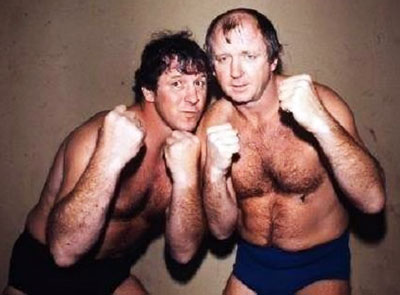 As the WWF embarked on its national expansion during the Eighties, Dory and Terry Funk, like so many other NWA mainstays, eventually joined Vince McMahon’s promotion. Once again teaming with his brother Terry, Dory Funk (who was renamed “Hoss” Funk during his WWF tenure) was managed by Jimmy Hart and under the guidance of “The Mouth of the South” the Funk Brothers appeared at WrestleMania II, where they defeated the team of Tito Santana and The Junkyard Dog. Shortly after WrestleMania, Terry Funk left the promotion while Dory remained and was reprogrammed with his storyline “brother” Jimmy Jack Funk (Jesse Barr). Still under the management of Jimmy Hart, the new Funk Brothers team enjoyed a successful run together, notably engaging in an exciting series with the British Bulldogs.
As the WWF embarked on its national expansion during the Eighties, Dory and Terry Funk, like so many other NWA mainstays, eventually joined Vince McMahon’s promotion. Once again teaming with his brother Terry, Dory Funk (who was renamed “Hoss” Funk during his WWF tenure) was managed by Jimmy Hart and under the guidance of “The Mouth of the South” the Funk Brothers appeared at WrestleMania II, where they defeated the team of Tito Santana and The Junkyard Dog. Shortly after WrestleMania, Terry Funk left the promotion while Dory remained and was reprogrammed with his storyline “brother” Jimmy Jack Funk (Jesse Barr). Still under the management of Jimmy Hart, the new Funk Brothers team enjoyed a successful run together, notably engaging in an exciting series with the British Bulldogs.
Following his run with Jimmy Jack, Dory Funk, Jr. left the WWF and effectively retired from active full-time competition. However, although he no longer wrestled on a full-time basis, he appeared (often teaming with brother Terry) for many more years to come in promotions across the globe. Be it in Smoky Mountain Wrestling, ECW, WCW, the World Wrestling Council, All Japan or New Japan, Dory Funk remained a visible and important part of pro wrestling well into the 21st century.
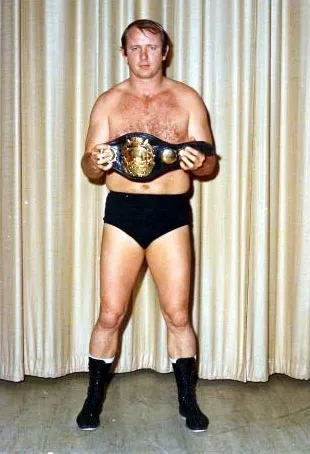
Ever a promoter of the growth and future of professional wrestling, Funk also opened a Florida-based training center and promotion, the Funking Conservatory, and the group’s regional television program entitled “Bang!TV” featured many new, up-and-coming “homegrown” performers. Additionally, his WWF-sponsored training seminars during the mid-Nineties, named the “Funkin’ Dojo,” helped hone the skills of numerous future superstars, including the Hardy Boyz, Lita, Edge and Christian, Kurt Angle and Mickie James.
Dory Funk, Jr. is a recipient of numerous awards, including Pro Wrestling Illustrated’s Match of the Year (1973 & 1974, vs. Harley Race and Jack Brisco, respectively), and the PWI Stanley Weston Award (2014), Tokyo Sports’ Match of the Year (1980, with Terry Funk vs. Giant Baba & Jumbo Tsuruta), and the Cauliflower Alley Club’s Lou Thesz Award (2019). Additionally, Funk is a member of the Stampede Wrestling Hall of Fame (1995), the Wrestling Observer Newsletter Hall of Fame (1996), the Professional Wrestling Hall of Fame and Museum (2005), the NWA Hall of Fame (2006), the St. Louis Wrestling Hall of Fame (2008), the WWE Hall of Fame (2009), and the George Tragos/Lou Thesz Professional Wrestling Hall of Fame (2011).
